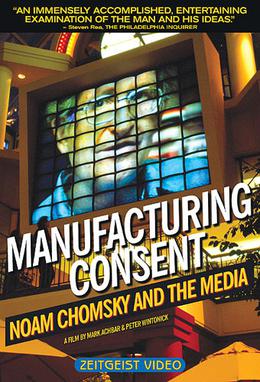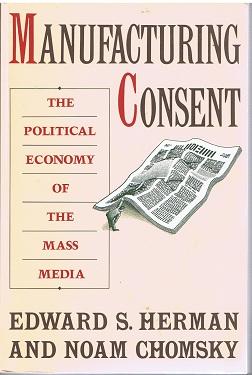
Manufacturing Consent: Noam Chomsky and the Media is a 1992 documentary film that explores the political life and ideas of linguist, intellectual, and political activist Noam Chomsky. Canadian filmmakers Mark Achbar and Peter Wintonick expand the analysis of capitalism and mass media presented in Manufacturing Consent, a 1988 book Chomsky wrote with Edward S. Herman.

Manufacturing Consent: The Political Economy of the Mass Media is a 1988 book by Edward S. Herman and Noam Chomsky. It argues that the mass communication media of the U.S. "are effective and powerful ideological institutions that carry out a system-supportive propaganda function, by reliance on market forces, internalized assumptions, and self-censorship, and without overt coercion", by means of the propaganda model of communication. The title refers to consent of the governed, and derives from the phrase "the manufacture of consent" used by Walter Lippmann in Public Opinion (1922). Manufacturing Consent was honored with the Orwell Award for "outstanding contributions to the critical analysis of public discourse" in 1989.

The Corporation is a 2003 Canadian documentary film written by University of British Columbia law professor Joel Bakan and filmmaker Harold Crooks, and directed by Mark Achbar and Jennifer Abbott. The documentary examines the modern corporation. Bakan wrote the book The Corporation: The Pathological Pursuit of Profit and Power during the filming of the documentary.
Mark Achbar is a Canadian filmmaker, best known for The Corporation (2003), Manufacturing Consent: Noam Chomsky and the Media (1994), and as an Executive Producer on over a dozen feature documentaries.
StudioCanal S.A.S. is a French film & television production and distribution company which is a subsidiary of the Canal+ Group.
Peter Kenneth Wintonick was a Canadian independent documentary filmmaker based in Montreal. A winner of the 2006 Governor General's Award in Visual and Media Arts, former Thinker in Residence for the Premier of South Australia, prolific award-winning filmmaker, he was one of Canada's best known international documentarians.
Kino Lorber is an international film distribution company based in New York City. Founded in 1977, it was originally known as Kino International until it was acquired by and merged into Lorber HT Digital in 2009. It specializes in art house films, such as documentary films, classic and rarely seen films from earlier periods in the history of cinema, and world cinema. In addition to theatrical distribution, Kino Lorber releases films in the home entertainment market and has its own streaming services for its digital library.
The Sony Pictures Entertainment Motion Picture Group is a division of Sony Pictures Entertainment to manage its motion picture operations. It was launched in 1998 by integrating the businesses of Columbia Pictures Industries, Inc. and TriStar Pictures, Inc.
Becker Entertainment is an Australian production company.

Dogwoof is a film-distribution company based in the United Kingdom.

CIC Video was a home video distributor, established in 1980, owned by Cinema International Corporation, and operated in some countries by local operators. Outside North America, it distributed films by Universal Pictures and Paramount Pictures, CIC's partners. DreamWorks films were added to the company output in 1998, as the fledgling studio had a worldwide video distribution deal with Universal.
KRS Releasing is a Maltese film distributor company, formed in 1946 under the name of the Malta United Film Corporation.
Ocean Shores Video Limited is the home video division of Win's Entertainment Co Ltd. The company is owned by Television Broadcasts Limited the entertainment division of Panasonic, Pioneer and Philips was a Hong Kong–based distributor of martial arts films in the 1980s.
Film Australia was a company established by the Government of Australia to produce films about Australia in 1973. Its predecessors were the Cinema and Photographic Branch (1913–38), the Australian National Film Board, and the Commonwealth Film Unit (1956–72). Film Australia became Film Australia Limited in 1988 and was consolidated into Screen Australia in 2008.

China Film Group Corporation (CFGC) is the largest, most influential film enterprise in the People's Republic of China, owned by the Central Propaganda Department of the Chinese Communist Party. According to Forbes, it is a state monopoly that all imported films have to work with. It also runs theaters and finances, produces, and distributes films. In 2014, the company was the largest film distributor in China, with 32.8% of the market.
Roadshow Entertainment is an Australian home video, production and distribution company that is a division of Village Roadshow that distributes films in Australia and New Zealand. Their first release was Mad Max. Roadshow Entertainment is an independent video distributor in Australia and New Zealand.
Katherine Dodds is a Canadian Impact Creator, writer, artist, and filmmaker.

Requiem for the American Dream: The 10 Principles of Concentration of Wealth & Power is a book by political activist and linguist Noam Chomsky. It was created and edited by Peter Hutchison, Kelly Nyks, and Jared P. Scott. It lays out Chomsky's analysis of neoliberalism. It focuses on the concentration of wealth and power in United States over the past forty years, analyzing the income inequality. The book was published by Seven Stories Press in 2017.
Umbrella Entertainment is a privately-held Australian film production and distribution company that began operating in 2001. It is based in Kew, Victoria.







